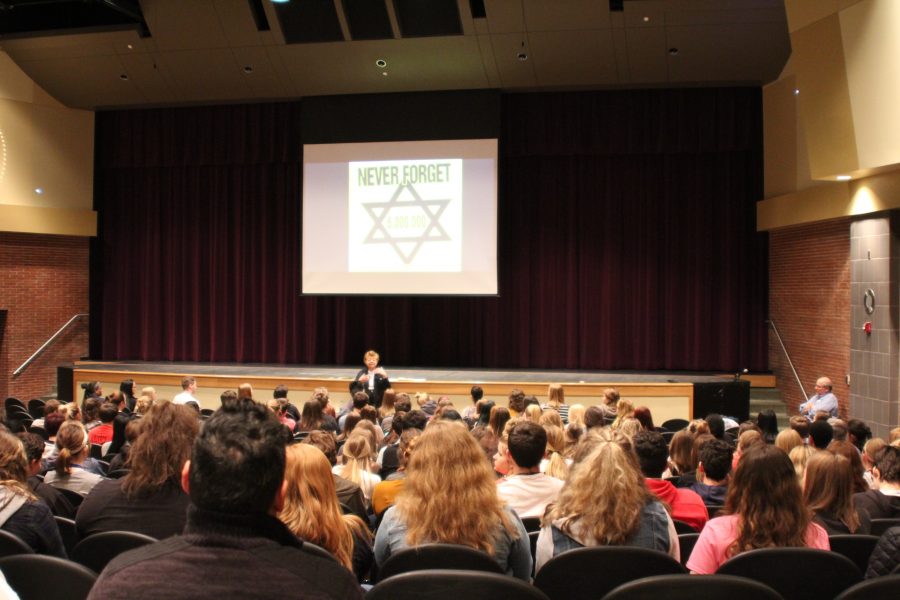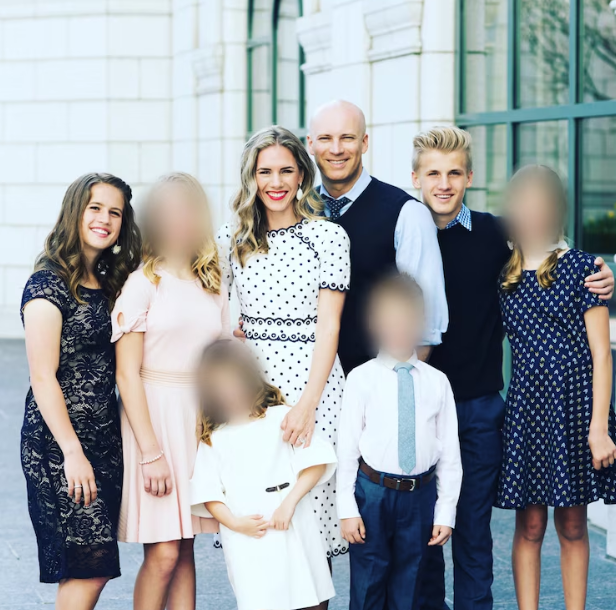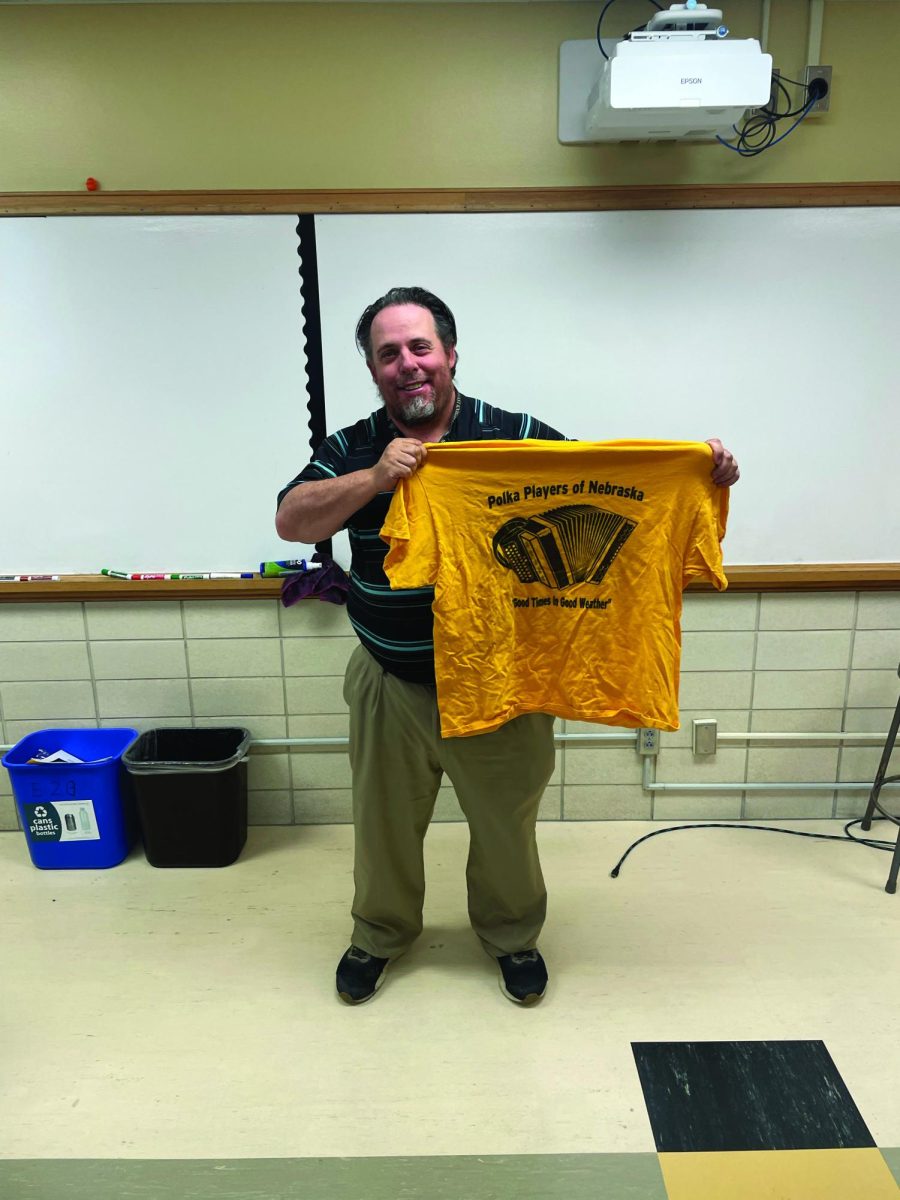By: Brittney Clark –
On March 27th, Southeast students were granted a once in a lifetime opportunity to hear and meet a Holocaust survivor. Magda Brown, originally from Hungary, was invited to speak by Holocaust Literature teacher Paul Smith. The importance of testimonies such as Brown’s are to reinforce the fact that the Holocaust did in fact happen and to narrow the scope on the unimaginable number of the 6,000,000 lives lost. We have become so desensitized to the trauma and terror around us, but through her oral history, Brown was able to open our eyes and our hearts to the personal suffering of the tragedy we know as the Holocaust.
“From ‘33-’35, the anti-Jewish laws are beginning, and they hit people from all aspects of life,” said Brown. “Discrimination works in every phase of it.”
Before the infamous Nuremberg Laws, the Law for the Restoration of Professional Civic Service was enacted. This law barred any Jews with high status positions from working.
“From one day to the next, they [the Jews] get a pink slip,” said Brown. “You’re out of a job, that’s it. There was no such a thing as a welfare system to support them. There were thousands and thousands of unemployed people and the Jewish community had to pull their resources to feed these people and keep them going.”
Shortly after, the Nuremberg Laws were passed, which consisted of two laws. The first was the Reich Citizenship Law which said only Germans of “kindred blood” were considered citizens, outlining what it meant to be a German and what it meant to be a Jew. The second was the Law for the Protection of German Blood and Honor, which forbade any marriages or sexual relations between Germans and Jews.
“These anti-Jewish laws kept hitting us one after another, after another. There was no end to it,” said Brown. “You see, what it does is reduce you to the lowest level, below an animal. Step by step, by step. They take away your freedom, they take away your property, they take away your daily existence.”
But it didn’t stop there. They took the degradation to the Jewish who had fought or were fighting for their country: veterans and soldiers.
“Until this time, all men of military age would enter the Hungarian military — no discrimination, for any religion — they were just Hungarian soldiers,” said Brown. “Matter of fact, my dear father was a dedicated proud Hungarian soldier of the World War l. He was proud of his medal, he fought for his country with all his heart. Now, the Hungarian government decides that a Jewish young man could no longer wear the country’s uniform nor bear arms. However they still have to enter the military, except he’s not called a soldier now, he’s called a member of the Jewish Labor Force.”
Brown’s brother was sent off to the military after this had been enacted and he experienced the segregation firsthand. He, along with the other Jewish soldiers, lived in a subunit and were supervised by Hungarian soldiers who “treated them in the most abusive way, physically and mentally.”
This was the start of one of, if not the worst genocides this world has ever seen: these laws laid the foundation for much worse to follow.
“I coined the Holocaust the following way: a premeditated, scientifically coordinated, mass murder,” said Brown.
Hungary, the country where Brown was born and raised, was an ally of Germany and had been dismissed from the Nazi regime that had been taking over other countries. All the Hungarian government needed to do was pass the laws and they would be overlooked. Unfortunately, that didn’t last forever. In March of 1944, Nazi units entered Hungary. They were openly welcomed by the government, military and police. Soon after, the police would receive a master order to start rounding up Jewish families, the first step in the process of ghettoization.
Next they received an order to sew the Star of David onto their clothing. Weeks later, they were to be sent to the ghetto. They were given an hour notice to pack provisions for three to four days.
“Now here I’m gonna give you a little English lesson: we understand, in America, a ghetto is a place where an ethnic group decides to reside, but thank God they have freedom to pick up and move somewhere else,” said Brown. “In real life, a ghetto is something totally different.”
The Hungarian government would eventually move close to half a million Jews and Gypsies in 51 days, from 147 transports out of the ghettos, “like a finely tuned clock.”
“The government didn’t give a hoot…The Hungarian police had an umbrella group — these were the most brutal human– don’t even give them the courtesy of ‘human’– beings on this earth,” said Brown. “I recognize the fact that a soldier has to obey orders, I understand that. But when that soldier obeys that order 200 percent more than what is expected of him, that is sheer brutality and they practiced that with great pleasure.”
The conditions were very strenuous for the people who had to relocate, most often taking place in a forced march. Fortunately for Brown, the ghetto ended up being the place where she was born and raised.
“My house became part of the ghetto,” said Brown. “It was a comfortable home, for my parents, my brother and I, and an aunt and uncle that lived with us. We all had our own space.”
An executive decision was made by a Nazi member that forced strangers to live with Brown and her family.
“Human courtesy died,” said Brown. “What if my grandmother or my aunt came from another community and would’ve liked to stay in my community so at least we could be together? Zero, he just shoved a bunch of people in. My home became the residency of 40 people. You cannot fathom what crowded conditions are… Every one of the human behaviors was there: there were the silent ones, the crying ones, the sick ones, the praying ones. It was chaos.”
However, through the chaos, she was able to learn a valuable life lesson. She learned to share by lending her clothes to her friends and neighbors.
“I was a spoiled brat, I had my own room, I had my own stuff,” said Brown. “This is where I learned to share, because sharing is a very important part of life.”
Unfortunately the Nazi’s had their own idea of “sharing:” breaking into older homes to steal their valuables.
“The Hungarian Nazi party was comprised largely by a group of young, uneducated hoodlums,” said Brown. “They were paid up, they were out to hurt the Jews, rob the Jews, kill the Jews and they very obediently responded… I want you to understand that until this point, this police protected me and every other Hungarian citizen. Now the police looked the other way.”
This happened for a couple weeks. Then another order was issued.
“We have to turn in all our cash, jewelry, radios, and other valuables,” said Brown. “I want you to understand the cash they take from us pays the Hungarian railroad worker to ship us to Auschwitz to our death.”
In early June they received an order that the ghetto was to be evacuated and sent to another country in need of laborers. 14,500 Jews were marched through the city into a brick yard. Here, on Brown’s 17th birthday, they would be stuffed into cattle cars. Inside each car were two buckets, one that functioned as a toilet and the other as the community water source.
“You cannot fathom what thirst is,” said Brown. “It is so overpowering that you forget about your physical pain [and] your stress, the only thing you can focus on is ‘If only I could have a sip of water…’ Your mouth is dry and you cannot focus on anything else.”
It was a long three day journey to the unknown.
“They open the doors and some strange, emaciated looking man wearing a striped uniform entered the boxcar and spoke a different language,” said Brown. “You’d be surprised how you learn under these conditions how to understand. What they were trying to tell us was to leave your little package in this car, you will get it later. Later never ever comes. Even that little bit of something we brought from home, we’ll never see again.”
She wasn’t prepared for the loss she’d suffer next. As men and women were separated, her father was sent to the left. That was the last time she saw him.
“The lie of the 21st century: it was said to us that, ‘the families will stay together,’” said Brown.
After losing sight of her father, she was among a large crowd of the elderly, women, and children.
“My aunt is standing next to me and she said, ‘Hold onto your mother so you don’t lose each other,’” said Brown. “We go forward and all of a sudden a group of Nazi officers are facing us. They put up their hands, which by now we understand [means] to stop. We are not human beings anymore; nobody speaks to us, they just point. You are like a robot, do this, move this. One officer steps forward and he points a finger, so I move. My dear mother, who was a very young looking 42 year old, holds onto me and that’s all he needs to see to [send her] that way.”
The process Brown endures next was described as a “military regime.” They were taken to get undressed, losing their final possessions. Then all of their body hair would be shaved and disinfectant would be sprayed on their freshly shaven body. The 500 people she was with were planned to be sent to a killing center at Birkenau, so they had to lie on the floor “like sardines in a can” while waiting. An older prisoner was allocated to be their supervisor. Her job was to wake them up and line them up in rows of five.
“She starts counting to 500,” said Brown. “If her count is off, she starts again. This insanity of counting is unbelievable, it can take an hour [or] two, several times a day. You have to stand erect like a soldier…To this day, after so many years, I still cannot find a rationale behind this counting incessantly.”
The security measures to keep prisoners from escaping were incessant as well.
“Every couple of feet there was a Nazi woman guard with a dog, watching every movement we were making,” said Brown. “Every couple of yards there was a watch tower with a soldier aiming a machine gun at us. If that’s not enough, the entire camp was surrounded by electrified barb wire fence. You tell me, where could I escape to?”
Even if the camp had been more relaxed with its enforcements, it’s not likely that the prisoners would’ve had enough energy to attempt an escape. Brown estimated their calorie intake, on a good day, to be between 400-500 calories. They were also lucky to get water once a day.
“The first day we had to stand in line, they had a big kettle of green liquid with unrecognizable stuff swimming in it,” said Brown. “We started gagging and we wouldn’t swallow it so the old-timers kept hoarding around us and said, ‘Give it to me!’ Little did we realize that this would become our steady diet; eat it or else.”
This proved beneficial when it came time for selection.
“Selection meant we had to go out in the courtyard, we had to disrobe [undress] halfway, and I guarantee they were not looking for our sexual beauty; they wanted to know how strong our upper arms were,” said Brown.
Two groups emerged from the selection: one was to be moved to more extreme labor and the other met an uncertain fate. Brown was in the first group and was put on another cattle car train to Germany where she would work in an underground ammunition factory that manufactured rockets and bombs. The bombs had to be filled with a highly concentrated poisonous liquid material that ran through the factory in a tube all the way to Brown’s work station. Her job was to open the neck on the bomb, fill it with the hose, cap both off. Then two other people lifted it away to be transported to a warehouse location.
“About six months or so into it, if your hair was black, it was orange, your skin was lemon yellow, and your lips are dark purple,” said Brown. “We were working with this highly poisonous material without any protective garments so it started invading our bodies, but thank God the end was near.”
Shortly after she was sent on a death march to Buchenwald. En route, she was liberated by two scouts from the 6th Armored Division.
To ensure this doesn’t happen again, Brown left her audience with this piece of advice.
“Protect your freedom because slavery is hell on earth. I want you to think before you hate. I’m not telling you to hate or not to hate, that’s entirely up to your conscious, but at least give it some thought… I want you to understand that genocide that does not happen from one minute to the next, it builds gradually. Whatever you learn from my testimony, use it for your own… You are the future of our generation, do the best.”









Cheney • Mar 28, 2017 at 10:21 PM
You are such a good writer and this is a story that everyone should see!